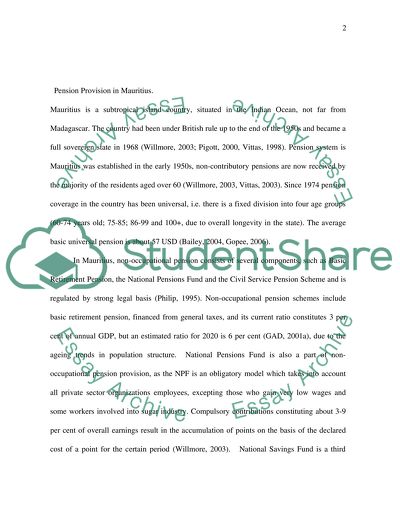Cite this document
(The Future of Private and Public Pension Provision in the Next Five Years in Mauritius Essay Example | Topics and Well Written Essays - 1500 words, n.d.)
The Future of Private and Public Pension Provision in the Next Five Years in Mauritius Essay Example | Topics and Well Written Essays - 1500 words. https://studentshare.org/law/1538054-the-future-of-private-and-public-pension-provision-in-the-next-five-years-in-mauritius
The Future of Private and Public Pension Provision in the Next Five Years in Mauritius Essay Example | Topics and Well Written Essays - 1500 words. https://studentshare.org/law/1538054-the-future-of-private-and-public-pension-provision-in-the-next-five-years-in-mauritius
(The Future of Private and Public Pension Provision in the Next Five Years in Mauritius Essay Example | Topics and Well Written Essays - 1500 Words)
The Future of Private and Public Pension Provision in the Next Five Years in Mauritius Essay Example | Topics and Well Written Essays - 1500 Words. https://studentshare.org/law/1538054-the-future-of-private-and-public-pension-provision-in-the-next-five-years-in-mauritius.
The Future of Private and Public Pension Provision in the Next Five Years in Mauritius Essay Example | Topics and Well Written Essays - 1500 Words. https://studentshare.org/law/1538054-the-future-of-private-and-public-pension-provision-in-the-next-five-years-in-mauritius.
“The Future of Private and Public Pension Provision in the Next Five Years in Mauritius Essay Example | Topics and Well Written Essays - 1500 Words”. https://studentshare.org/law/1538054-the-future-of-private-and-public-pension-provision-in-the-next-five-years-in-mauritius.


